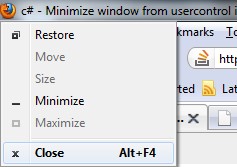本文告诉大家如何隐藏系统窗口菜单
系统的窗口菜单请看下图
通过在消息里面钩调一些消息的方式,此方法由 黄滨滨 大佬提供
private IntPtr Hook(IntPtr hwnd, int msg, IntPtr wparam, IntPtr lparam, ref bool handled)
{
if (msg == 0x112)
{
var param = wparam.ToInt32();
if (param is 0xf093 // 单击打开菜单
|| param is 0xf100)//键盘打开菜单
{
handled = true;
}
}
else if (msg == 0xa4)
{
var param = wparam.ToInt32();
if (param == 0x02 // 非图片客户区
|| param is 0x03)
{
handled = true;
}
}
return IntPtr.Zero;
}
第二个方法是通过设置样式
public MainWindow()
{
InitializeComponent();
SourceInitialized += OnSourceInitialized;
}
private void OnSourceInitialized(object sender, EventArgs e)
{
var windowInteropHelper = new WindowInteropHelper(this);
var hwnd = windowInteropHelper.Handle;
var windowLong = GetWindowLong(hwnd, GWL_STYLE);
windowLong &= ~WS_SYSMENU;
SetWindowLongPtr(hwnd, GWL_STYLE, new IntPtr(windowLong));
}
public const int WS_SYSMENU = 0x00080000;
[DllImport("user32.dll", SetLastError = true)]
public static extern int GetWindowLong(IntPtr hWnd, int nIndex);
public const int GWL_STYLE = -16;
public static IntPtr SetWindowLongPtr(IntPtr hWnd, int nIndex, IntPtr dwNewLong)
{
if (Environment.Is64BitProcess)
{
return SetWindowLongPtr64(hWnd, nIndex, dwNewLong);
}
return new IntPtr(SetWindowLong32(hWnd, nIndex, dwNewLong.ToInt32()));
}
[DllImport("user32.dll", EntryPoint = "SetWindowLong")]
private static extern int SetWindowLong32(IntPtr hWnd, int nIndex, int dwNewLong);
[DllImport("user32.dll", EntryPoint = "SetWindowLongPtr")]
private static extern IntPtr SetWindowLongPtr64(IntPtr hWnd, int nIndex, IntPtr dwNewLong);
本文代码放在 github 欢迎小伙伴访问
本文会经常更新,请阅读原文: https://dotnet-campus.github.io//post/WPF-%E9%9A%90%E8%97%8F%E7%B3%BB%E7%BB%9F%E7%AA%97%E5%8F%A3%E8%8F%9C%E5%8D%95.html ,以避免陈旧错误知识的误导,同时有更好的阅读体验。
 本作品采用
知识共享署名-非商业性使用-相同方式共享 4.0 国际许可协议
进行许可。欢迎转载、使用、重新发布,但务必保留文章署名
lindexi
(包含链接:
https://dotnet-campus.github.io/
),不得用于商业目的,基于本文修改后的作品务必以相同的许可发布。如有任何疑问,请
与我联系
。
本作品采用
知识共享署名-非商业性使用-相同方式共享 4.0 国际许可协议
进行许可。欢迎转载、使用、重新发布,但务必保留文章署名
lindexi
(包含链接:
https://dotnet-campus.github.io/
),不得用于商业目的,基于本文修改后的作品务必以相同的许可发布。如有任何疑问,请
与我联系
。
